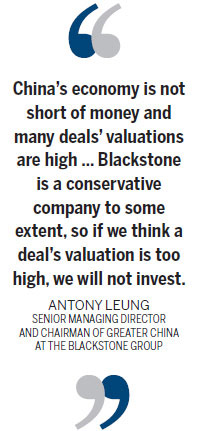Keeping a cautious eye out for deals
Blackstone not in a hurry to jump on the M&A train in China, says Leung
While private equity (PE) and venture capital (VC) institutions are pursuing pre-float deals with high valuations in China, the world's fastest growing market, Antony Leung, senior managing director and chairman of The Blackstone Group Greater China, is on record as gently saying that his firm prefers to be patient and discover appropriate opportunities in sectors the government supports.
|
 Antony Leung suggests investors peruse the five-year plan to find potential opportunities. [Provided to China Daily]
|
However, Blackstone, the PE firm known for raising the largest buyout fund in the world, did not make any big moves in China during that period.
"We have a strong desire to invest more in China, but we are patient. We are waiting for proper opportunities," Leung says.
Blackstone's investment pace in China is comparatively slow since arriving in Asia four years ago. So far it has only five equity investments: China Bluestar Group, a State-owned company engaged in specialized chemistry; Dili Group Holdings Co, a Chinese agricultural company; Channel One, a retail business based in Shanghai; a real estate development in Dalian, Liaoning province; and China Animal Healthcare Ltd, an animal medicine business.
"China's economy is not short of money and many deals' valuations are high. Some of the pre-IPO deals were valued higher than public companies," Leung says. "Blackstone is a conservative company to some extent, so if we think a deal's valuation is too high, we will not invest."
Blackstone has been in the PE business for 25 years, with total assets under management of $150 billion (105.6 billion euros). The annual returns on investment to its PE limited partners (LPs) has been 23 percent on average.
|
||||
Investment in China
"The prospects for the Chinese market are very good over the long term," Leung says.
He suggests investors peruse the government's annual report and the five-year plans to find potential opportunities.
In the West, a government mainly serves as the regulator and policymaker. In China, the government participates in the economic operation and can play a significant role in financing, giving it the ability to implement its economic plans.
He believes the opportunities in China now are in domestic consumption, healthcare, urbanization, outbound investment, industrial upgrades, new energy and materials, all of which are highlighted in China's 12th Five-Year Plan (2011-2015).
Although he is keeping an eye on those sectors, he maintains he is still prudent. Regarding the Chinese property market, Leung says it depends on government policies but its prospects in the long term are good.
Blackstone's abundant funds and global merger and acquisition (M&A) experience enable the PE firm to help Chinese companies expand overseas.
It supported Bluestar in successfully acquiring a chemical company in northern Europe for $2 billion.
According to Leung, unlike investment banks, in addition to arranging the acquisition, PE firms can help in providing capital, due diligence, deal structuring and post-deal integration, which are what Chinese companies really need when going abroad.
"Our goal is to make the acquired company stronger and help our co-investors (the Chinese companies) make profits. Only by doing this can we make a success as well," Leung says.
In recent years, M&As by Chinese companies overseas have boomed but the results have not always been good.
According to the Ministry of Commerce, direct investment abroad in the non-financial sectors amounted to $59 billion in 2010, a year-on-year increase of 36.3 percent. It involved 3,125 foreign enterprises in 129 nations and regions.
In the past two decades, 67 percent of overseas M&As by Chinese companies ended in failure, a study by global management consulting firm McKinsey & Co shows.
Experts say the reasons are mainly inadequate analysis of the industry chain, incorrect market trend forecast, excessively high self-evaluations and lack of understanding of the local law and tax environment.
"In this area, Blackstone can take a bigger role," Leung says.
|
 |
Yuan-denominated fund
In 2009, Blackstone was the first foreign PE firm to set up a yuan-denominated fund, with a target to raise 5 billion yuan (3.5 billion euros). By the first closing, which finished in October, more than half the sum had been raised.
Leung says it was taking so long to raise the cash because of the need to seek a series of approvals from various government departments.
He says the fund managers intend to seek funds from the National Social Security Fund (NSSF) of China, a strategic reserve fund set up by the nation's central government to support future social security expenditure and other social security needs.
"It will be great to have the NSSF, which is currently China's largest LP in PE funds. The NSSF intends to invest 10 percent of its assets under management in PE funds - about 100 billion yuan. That is a very large sum," Leung says.
Leung says there are excellent Chinese managers running yuan-denominated funds, but the Chinese PE market is still in the early stage of development.
"Experienced foreign PE firms participating in the yuan-denominated PE market can provide options to the Chinese LPs such as the NSSF, benefiting the people it protects," Leung says.


















